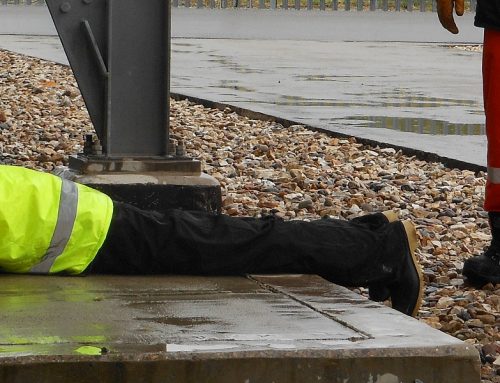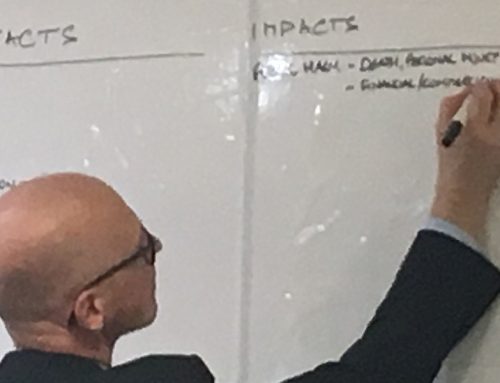It is widely accepted that the on-shift Emergency Response Team (ERT) needs regular training and exercises to keep skills fresh and maintain capability to assure regulatory compliance. The best organisations use a systematic approach to ERT training, backed up by accurate record keeping to facilitate monitoring, forecasting and scheduling training sessions. This approach ensures competency maintenance not just at an individual level but also at the organisational level. Organisations need to know there is a consistent level of ERT capability in place across the full range of shift teams. If you can demonstrate a systematic auditable approach to ERT training and competence assurance, then this goes a considerable distance towards regulatory compliance with this aspect.
Skills fade
We recommend organisations implement a regular ERT training programme to keep skills fresh and provide a good level of competency assurance. Regular refresher training helps to maintain familiarity with the core processes and common response actions required, such as quickly completing a full site muster and confirming everyone is accounted for. Without regular refresher training, competence reduces over time because the skills are not exercised. This means the level of preparedness for tackling emergency situations goes down. This is where the systematic approach to ERT training comes into its own. The record-keeping and forecasting system indicates when refresher training is due, prompts action to schedule refresher training and therefore prevents skills fade. Managing the training programme in this way assures the competency of the ERT and a consistently effective response.
Learning styles
We deliver high quality training using tried and tested techniques alongside innovative methods, in order to get the best value from our time with your people. And we use a range of training delivery approaches to accommodate delegates’ different learning styles, based on models and theories such as the VARK system. This approach identifies individual learning preferences using four modalities – VARK – Visual, Auditory, Read/Write, and Kinaesthetic (hands-on). By using this widely accepted model we make sure our ERT training caters for everyone. The blend of theory sessions and practical exercises that form the core of our ERT training programmes are designed and delivered with these VARK modalities in mind, thus ensuring maximum engagement and value.
Training transfer
This is the whole purpose of ERT training sessions. The transfer of information and experience to develop knowledge, skills and behavioural response patterns. It is most effective to train less intensely but more often, easily increasing basic skills and competence. This means regular training for the ERT to keep skills fresh and maintain a good level of capability. Importantly, we also recommend that the training closely replicates the actual environment that it will be transferred back to. This type of high-fidelity training maximises training transfer and therefore value for money and a return on investment. We use a range of practical exercises based on the relevant organisational context and response capabilities.
Training evaluation
Organisations want to know that training programmes deliver value for money and a return on investment. We use a range of approaches to training evaluation to demonstrate these aspects, including an initial evaluation of delegate satisfaction and further information regarding the efficacy of the course in making long-lasting changes to attitudes and behaviours. We also carry out further evaluation of the transfer of training from the delivery session to the day-to-day functioning of the individuals and teams involved, using follow-up sessions and quantitative and qualitative analysis.
What makes the difference?
Eddistone Consulting have drawn together a team of specialists who have extensive collective experience, coming from industry, the emergency response services, the multi-agency response community, health & safety and education backgrounds, to develop and deliver a competency-based training and exercise framework with identified performance deliverables to measure effectiveness and assure competence.
We use a proven systematic approach that explores how to respond. We have core methodologies for each response level of Emergency, Incident and Crisis (Operational, Tactical and Strategic) management. The credibility and reality of our exercises, experienced in a safe environment where real learning takes place, is always valued by our customers.
How we can help
We recognise that many of our clients, especially in the COMAH-regulated sector, are under pressure to maintain mandated emergency management capacity. We are committed to providing you with emergency management support wherever possible throughout this pandemic. This is important to ensure that you do not fall behind with your scheduling backlog and to maintain the required capacity, despite the impact of absence and illness on safety-critical roles. We have two strategies to help you achieve this:
1. We have developed remote methods for training and assessment, coupled with remote mentoring for the development of key roles. This facilitates accelerated learning and makes the best use of technology and advanced learning practices.
2. We have a pool of experts ready to provide direct support, both remotely and in person, to reinforce capacity and mentor your existing capability. Our team of experts is ready to stand alongside your key emergency response personnel.
Contact us to discuss how we can help you.





